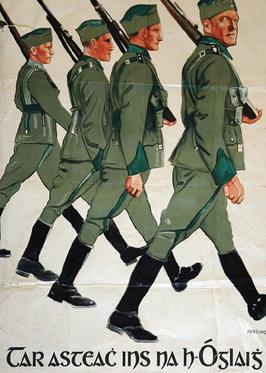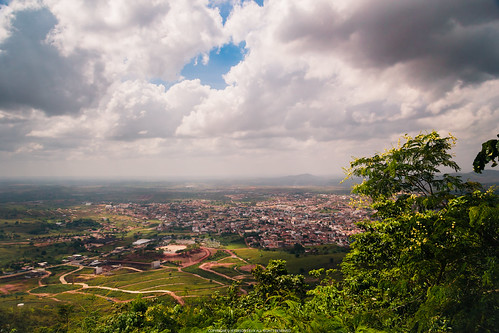Republic of Cruhanvor
Fort Cnoc Dubh, 20 km outside of the city of Port Dearg, Alba

Trying to instill drill in these disorganized savages was becoming a tiresome morning chore.
It had only been 3 weeks since Sáirsint Complachta Ciar Ó Dubhshláine had been assigned to train the new recruits. He was beginning to find, however, that these rowdy bunch of tribesmen were no better than a pack of wild animals in this early of a stage. They had been raised fighting each other in traditional ways; stick fighting, brawling, wrestling, and ganging up in clannish assaults.
That disorganized rabble would only get them a permanent place in a grave when time came for a real war. The world was changing, and the old ways of fighting had no place on the modern battlefield. Taioseach Bhioctoria knew that, wisdom that would keep Cruhanvor from becoming just another victim of some larger nation's war hunger. But if the country was to be safe, these men and women would need to be straightened out, turned from a pack of wild dogs into a well oiled machine.
The Sáirsint could think of no better place than in the mountain valley where Fort Cnoc Dubh had been constructed. The Highlands of Alba were known for forging warriors, making some of the greatest of Galian warriors. The natural land provided sheer cliffs for the recruits to climb and jog on. The fertile yet rocky land was perfect for teaching them to forage and hunt. And the danger of the land made desertion nigh impossible.
Lately, the Sáirsint had been having problems with a recruit, a man of Cymrian origin; one Mervyn mab Ofydd, from a village called Caerwyf. His apathy towards his training was begging to annoy Sáirsint Ó Dubhshláine. Just now, the man was standing limply in line, just returning from a hike in the mountains. He was not limp with exhaustion, however, but simply disinterested in his position.
“Recruit Mab Ofydd,” The Sáirsint sternly called out to the apathetic young man, who in turn responded by lazily swinging his head to face the Sáirsint’s.
“Yes, sir?”
“I cannot help but notice that you seem rather impassive in regards to your training.” Sáirsint Ó Dubhshláine, “Perhaps, there is a reason for this?”
The Cymrian responded as was to be expected, with little respect, “Indeed, I do. I see no reason for us to waste our time learning to march in step, to turn to the left and right, to learn how to hold a gun. These are all things we’ve been doing since we were kids; we already know how to fight”
The sound of murmuring began to emanate from the other recruits, some seeming to agree while others seemed to mumble in annoyance. The Sáirsint smiled as he began to recount a common tale that he liked to tell to new recruits.
“Are you aware, Recruit Mab Ofydd, that I was stationed in Ildathach when I was just an Earcach (recruit)?” The Cymrian looked in confusion but did not say anything as the Sáirsint continued his story. “We were sent there to keep peace, and protect Gaillimh Nua. There isn’t much out in the area where we were stationed, just rainforest, hot humid, soul crushing temperatures. Your body needs to be strong out there, because the sun, and the heat are unlike anything you will face in Cruithan.” The Sáirsint then turned to the recruits once more, “But, the worst thing in Ildathach, are the natives. The team I was assigned to, we were out dealing with complaints that the farmers were giving about something destroying their equipment out in the deeper parts of the forests they were taking down. A group of 5 of us, we went out, only to be ambushed by a group of 12 Tupis. Now, if we had followed our drill training, we could have easily routed these natives, but we were fools and decided to fight like we had as kids. The numbers of the tupis alone were able to overpower us, as we were to focused on our own personal brawls to watch out for each other. I was barely able to make out out alive, but 3 of our squad members, they were not so lucky. The Tupis took them out, and ate them, like they do to all prisoners they take. So, Recruit Mab Ofydd, you can follow my drill, and keep yourself alive, or you can fight like a savage, and end up getting eaten alive by a New Worlder, or perhaps you’ll find yourself being skewered by one of that Mad Man Napoleon’s men, when he finally decides he wants to destroy the Republic for his own gain.”
The recruits looked horrifed at the idea of being eaten alive by Tupis in Ildathach, though the Sáirsint was embellishing the story a bit. He had no idea what the fate of those soldiers was, though being cannibalized was certainly a real possibility. Though, what was a little fear to keep them in line. It would do them some good to be on guard while they were training, put some motivation in them.
Naomh Seán, Eastát na Chósta ó Dheas, Colony of Ilathach

The sugar crop had been very plentiful this year.
The switch to mechanization across the colony had been a great boon to everyone, increasing output, decreasing the reliance of slave labor, meaning more money for the common farmer all across the nation.
Ilathach had been described as paradise, but it was a paradise that needed to be fought for, a paradise to be conquered.
And the first step of taming the wild beast that is the Many Colored Land was to start moving out the dense rainforests standing in the way of crop-laying. However, when it came to that, problems always arose with the damn natives. They were incessant, always destroying machines, killing farmers, stealing animals, and destroying crops. Everyone knew they were trying to drive out the settlers, but all it lead to was a growing hatred between them. It was, an awkward situation. When the colony was first settled, many of the Galians and Cymrians took wives and husbands among the natives, producing resident natives in the settlements, and children of mixed descent, creating even more animosity within the colony itself.
But, that was to be dealt with later. The Sugar was keeping the colony strong for now, Cruhanvoir had reason to keep funding the colony, and aid in getting rid of the natives. The sugar was making good money for the nation, as were the fruits and new woods found among the rainforest.


